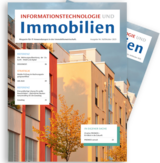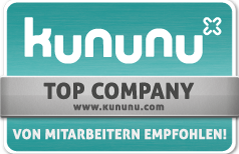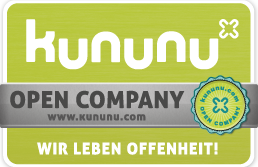The real estate industry 4.0 – digital, networked and always online

The Internet is becoming an increasingly a decisive factor in our everyday lives. A growing number of transactions are dealt with online, and businesses are investing heavily in digitising their business models and creating a web presence. The number of World Wide Web users is rising across the globe, including in Germany: last year, Internet use in Germany was over 70 percent in all age groups for the first time, and among young people up to 30 years of age, the rate is almost 100 percent (Figure 1). For today’s generation of schoolchildren, students and young professionals, the Internet has certainly become firmly and irreversibly entrenched in everyday life.
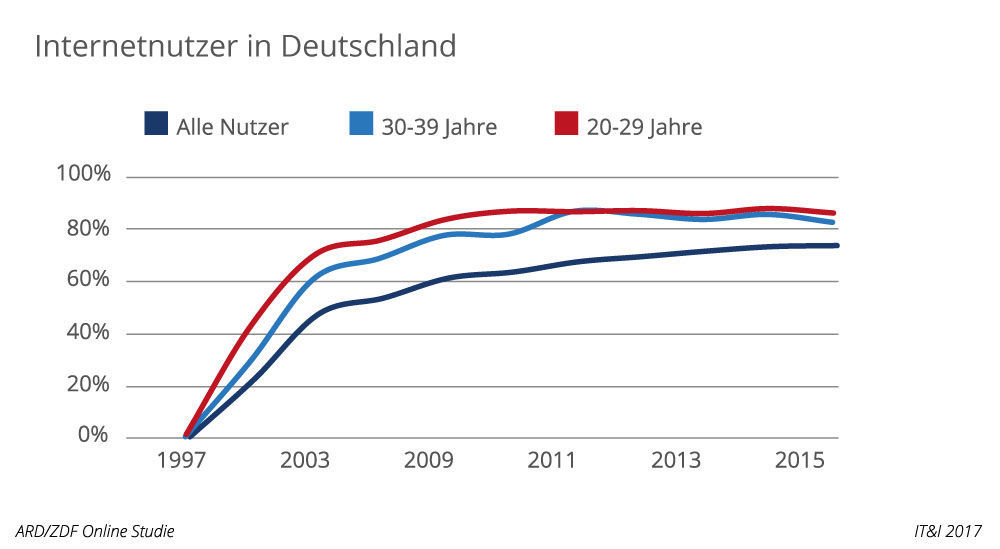
Figure 1: Certain age groups handle use the Internet at a rate of almost 100%.
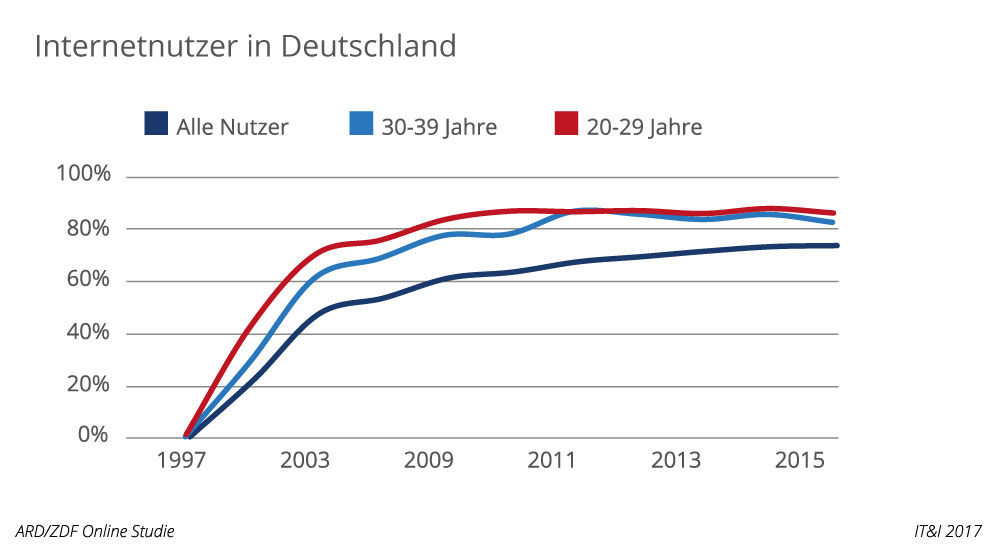 Figure 1: Certain age groups handle use the Internet at a rate of almost 100%. |
Social media – a cornerstone for business success
The young generation are the tenants of the future, so in the housing market, in particular, it is a good idea to use the Internet for trust-building measures and to pick up on current trends. The first trend is that social media has expanded beyond use for private purposes only and has become a crucial communications platform for companies. Looking back on the development over the past few years, it is clear how rapidly social media has established itself in every corporate strategy. In 2012, the market research company Analyse & Konzepte performed the first tenants’ survey in Germany regarding the use of social media channels. At that time, two thirds of those surveyed said that they used social media exclusively for private purposes. Only 42 percent could imagine looking for an apartment via Facebook and other social media, and a mere 11 percent said that they would consider contacting their landlord via social media.
Today, the picture is different at the quantitative level alone: an estimated 25 million people in Germany are registered on Facebook, and 35 million German citizens regularly watch videos on YouTube. In addition, new networks have emerged that focus on specific areas; for example, Instagram, Snapchat and Pinterest for commented images and WhatsApp and Twitter for short messages. Today, 40 percent of tenants under the age of 35 would like to communicate with landlords via social media. However, the response from business has so far been limited, with only a third of German companies using social networks in operational practice. In the housing industry, which is particularly geared towards regular communication with tenants, there is a lot of catching up to do. According to a study by the Chemnitz-based FOG Institute, in 2015, only 25 percent of the companies surveyed used online channels to contact existing and potential customers directly.
Internet to go – smartphones overtake PCs
The second trend is the mobilisation of Internet use. While in 2006, not even one tenth of German citizens accessed the Internet with their smartphone, by 2015, this had increased to 54 percent. Between 2009 and 2015, the number of smartphone users in Germany rose to 46 million – a jump of 700 percent (Figure 2). Furthermore, the percentage of mobile Internet use worldwide is now higher than access using stationary devices for the first time. According to the Federal Office for Statistics, German people use the Internet primarily to find information on goods and services, with 90 percent citing this as the main reason for their online activity. In contrast, only 60 percent said that they primarily search for videos and music via the Internet. Practical use therefore has a higher priority than recreational use. Yet in 2015, only five percent of the representative sample of housing companies had integrated their range of services into an app.
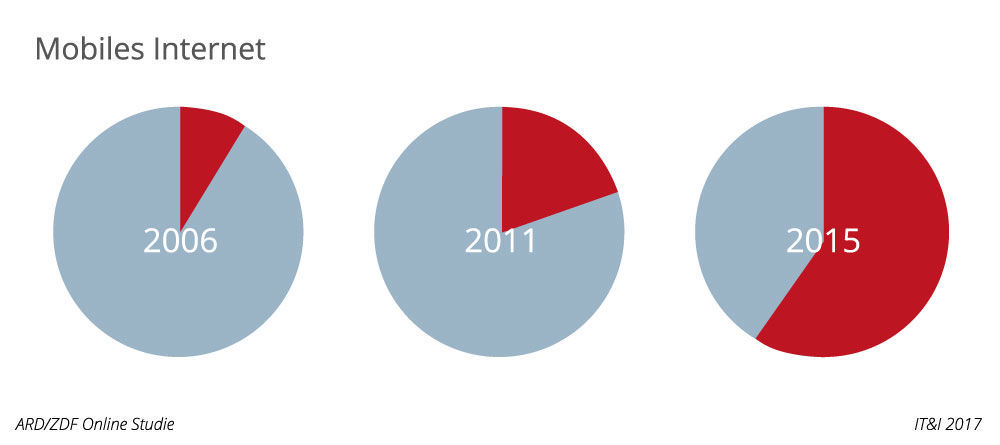
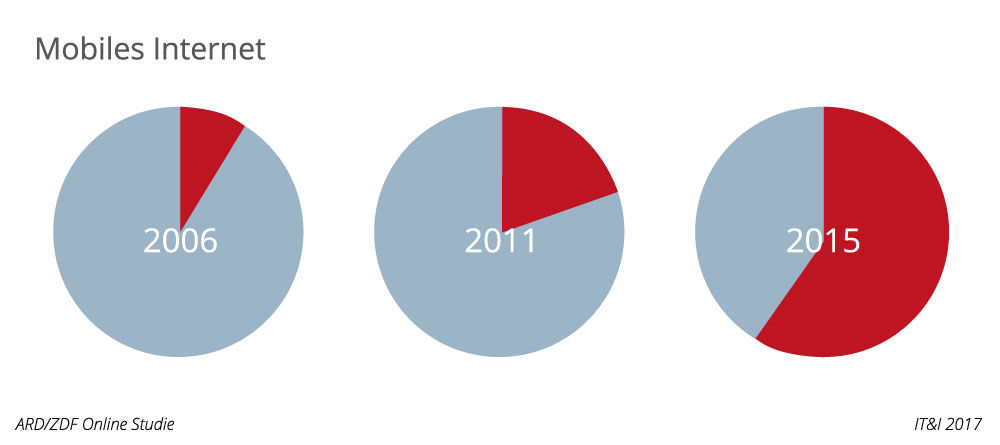 Abbildung 2: Die überwiegende Nutzung des Internets erfolgt heute über mobile Geräte. |
Gemäß dem Grundsatz der effizienten Mobilisierung sind diese Prozesse in eine Mieter App zu integrieren. Sie muss
allerdings nicht nur mit ihrem Design überzeugen, sondern auch mit dem zentralen IT-System gekoppelt sein.
Webkanäle am Anfang, zwischendurch und am Ende
Nach dem Bezug können alle laufenden Vorgänge der Mieterkommunikation online erfolgen: die Mitteilung der Verbrauchsdaten, die Berechnung der Nebenkosten, die Bestellung von Handwerkern – alles kann und sollte für den Mieter online möglich sein, ob auf dem Smartphone per Kunden App oder am PC via WebApp. Das Mietverhältnis endet in der Regel mit der Wohnungsabnahme: Eine Checkliste mit den einzelnen Räumen und Objekten der Wohnung auf dem mobilen Endgerät lässt auch diesen Prozess digitale Wirklichkeit werden. Innerhalb desselben digitalen Formulars unterschreibt der Mieter, das generierte PDF-Dokument landet per E-Mail im zentralen IT-System des vermietenden Unternehmens: So funktioniert Onlinekommunikation in der Wohnungswirtschaft.
ist heutzutage das Gebot der Stunde, die bewusste Abstinenz von den Web-Plattformen gefährdet hingegen die Position
im Markt. Daher bieten wir auf der easysquare Plattform unseren Kunden an, die verschiedenen Social Media-Kanäle für
die Prozesse rund um die Vermietung zu nutzen, beispielsweise um ein ansprechendes Exposé in einer Gruppe mit Interessenten zu posten. Die Möglichkeiten sind denkbar vielfältig. Doch Facebook-Auftritte, YouTube-Kanäle und Mieter Apps verpuffen ohne Effekt, wenn sie nicht an das zentrale IT-System gekoppelt sind. Anders gesagt: Für den bestmöglichen Kundenservice sollten alle relevanten Informationen gesammelt vorliegen. Werden diese Angaben auf verschiedenen Plattformen eingeholt, müssen sie an zentraler Stelle wieder zusammengeführt werden. Die Erfassung aller Vorgänge im ERP wird zur Grundbedingung für die erfolgreiche und effiziente Umsetzung der unternehmenseigenen Online-Strategie.
redaktion@openpromos.de
